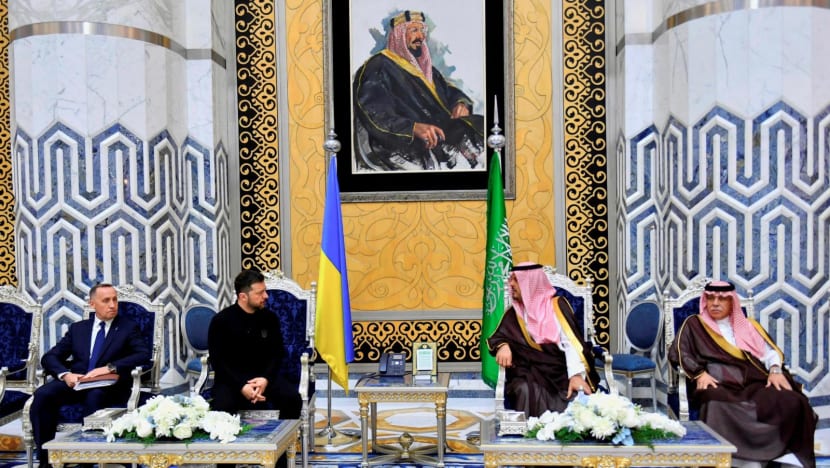Zelenskyy, Rubio arrive in Saudi for Russia ceasefire talks

Deputy Governor of the Holy City of Mecca Prince Saud bin Mishaal bin Abdulaziz meets Ukrainian President Volodymyr Zelenskiy during his visit to Jeddah, Saudi Arabia, Mar 10, 2025. (Photo: Saudi Press Agency/Handout via REUTERS)
Zelenskyy, embroiled in a public row with US President Donald Trump last month, touched down in Jeddah as Rubio cautiously welcomed the idea of an aerial and naval ceasefire.
Tuesday's talks between Ukrainian officials and Rubio's US team will be the first between the two sides since the White House blow-up when Zelenskyy left without signing a minerals deal demanded by Trump.
"We do have a proposal for a ceasefire in the sky and ceasefire at sea," a Ukrainian official told AFP on Monday, speaking on condition of anonymity.
"Because these are the ceasefire options that are easy to install and to monitor, and it's possible to start with them."
Rubio indicated the idea had promise.
"I'm not saying that alone is enough, but it's the kind of concession you would need to see in order to end the conflict," he told reporters.
"You're not going to get a ceasefire and an end to this war unless both sides make concessions."
Rubio added that he hoped to "resolve" the suspension of military aid that is threatening to hamper Ukraine's campaign.
"I think the notion of the pause in aid, broadly, is something I hope we can resolve. Obviously, what happens tomorrow will be key to that," he said.
Zelenskyy was expected to meet the de facto Saudi ruler Crown Prince Mohammed bin Salman later before his officials sit down with the US side on Tuesday.
"FRAMEWORK" FOR PEACE DEAL, CEASEFIRE
Britain's Financial Times newspaper, citing a source briefed on preparations for the talks, said Kyiv's offer of a partial ceasefire was aimed at convincing Washington to resume military aid and intelligence-sharing.
British Prime Minister Keir Starmer told Trump in a call on Monday that he hoped the talks would lead to the US resuming military aid to Ukraine, Downing Street said.
Before his departure for Jeddah, Zelenskyy said Ukraine wanted peace, insisting Russia was the sole reason that the war was carrying on.
"Ukraine has been seeking peace since the very first second of the war, and we have always said that the only reason that the war is continuing is because of Russia," he wrote on social media.
US Middle East envoy Steve Witkoff said Washington wanted to use the talks "to get down a framework for a peace agreement and an initial ceasefire as well".
In Jeddah, dozens of Ukrainian and Saudi flags flew on a main roundabout near the airport and on thoroughfares.
As well as Rubio, Mike Waltz, Trump's national security adviser, has also confirmed his participation.
Zelenskyy said his negotiators will include Foreign Minister Andriy Sybiga and Defence Minister Rustem Umerov, his chief of staff Andriy Yermak and Pavlo Palisa, a military commander and Yermak's deputy.
Analyst Allan Behm said it is now "inevitable" that Ukraine will have to make some territorial concessions, given that a lot of opportunity for negotiations has passed and the country "is in a weaker position" compared to three years ago.
"I think Ukraine is, at the moment, in a very perilous position. The US made it very clear during that extraordinary meeting last week that it was not prepared to put any of its interests at risk in order to assist Ukraine," noted Behm, a senior advisor at public policy think tank Australia Institute's International and Security Affairs Program.
"So, in all of this, I think Ukraine is finding itself very much on its own."
ZELENSKYY "OFFERED TO SIGN DEAL"
Zelenskyy has called the White House incident "regrettable" and said he was ready to work with Trump's "strong leadership". He also expressed readiness to sign the minerals deal.
Witkoff said Trump received a letter from Zelenskyy, calling it "a very positive first step" and "an apology".
Asked if Ukraine would sign the deal in Saudi Arabia, Witkoff said: "I think Zelensky has offered to sign it, and we'll see if he follows through."
Trump has renewed communications with Putin and criticised Zelenskyy, raising fears in Kyiv and among European allies that the US leader may try to force Ukraine to accept a settlement favouring Russia.
On Friday, however, Trump said he was considering further sanctions on Russia for "pounding" Ukraine on the battlefield.
Ukraine's European allies last week held a summit with Zelenskyy and announced they would greatly increase defence spending. Starmer will host virtual talks on Saturday to build on the meeting.
Meanwhile, a senior Ukrainian official told AFP that Russia could enjoy an advantage against Ukrainian troops if the US continues to refuse to share intelligence.
"If it lasts a long time, it will give the Russians a significant advantage," the source said.
Australia Institute's Behm said he thinks Russia will "make very heavy demands" for Ukraine.
"I think that for Russia, it has no need at the moment to make much by way of concession, particularly since it would now understand that the Americans are not prepared to put much of their own position at risk," he added.
Behm stressed that Ukraine will need "very clear indications" of military and long-term economic support from Europe and America.
"(But) Trump has made it clear that the Americans don't want to spend more money and that they would like lots of thank-you notes," he added.


















